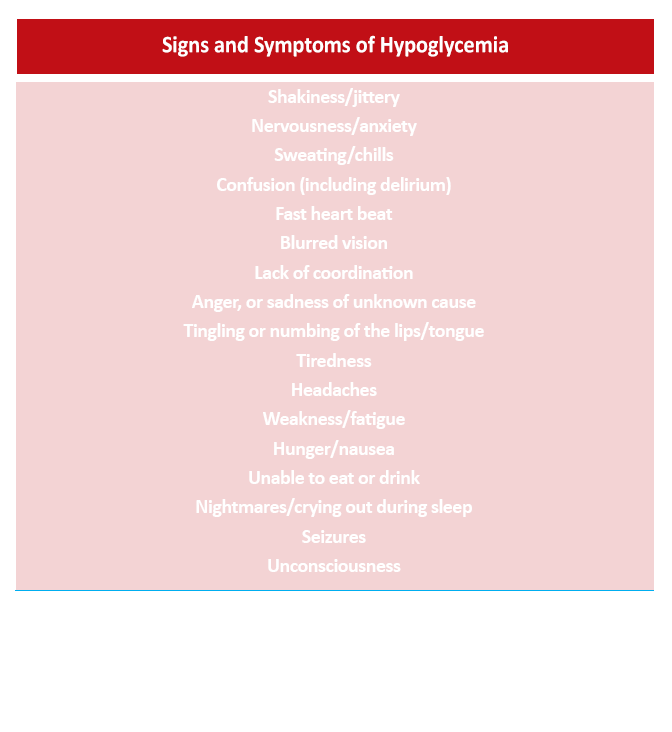Avoiding Hypoglycemia
Hypoglycemia is characterized by low blood sugar readings.1 A blood glucose reading below 70 mg/dL is defined as hypoglycemia and a reading below 54 mg/dL is severe hypoglycemia. You and your healthcare provider should have a detailed conversation about your specific blood glucose targets to minimize your risk of hypoglycemia.1 It is important that you are able to recognize the signs and symptoms of hypoglycemia so that you can immediately correct your blood glucose levels. Some of the signs and symptoms of hypoglycemia are listed in the table below. Please keep in mind that different people may experience symptoms differently; however, it is important to recognize the most common ones.

Hypoglycemia can be a side effect of insulin or other types of medications used for diabetes.2,3 Sulfonylureas and meglitinides are two types of diabetes medications that can cause hypoglycemia.2 Other causes of hypoglycemia include:2,3
- Not eating enough carbohydrates
- Skipping or delaying a meal
- Increasing physical activity
- Drinking too much alcohol and not eating enough food
- Being sick
- Taking your insulin or diabetes medication at the wrong time
- Taking too much insulin or diabetes medication
- Waiting too long after you take your medicine to eat your meals
- Not checking your blood glucose frequently
Certain medications are linked to a lower risk of hypoglycemia. Talk with your healthcare team to discuss treatment options if you are experiencing hypoglycemia you think may be caused by your medication.3
Other ways to prevent hypoglycemia include:2,3
- Checking your glucose level frequently
- Eating regular meals
- Being physically active (safely)
- Working closely with your healthcare team
Hypoglycemia unawareness occurs when blood glucose levels drop very low, but you may not feel any signs and symptoms. Hypoglycemia unawareness can also occur in patients with a long history of diabetes or in patients who must tightly control their blood glucose levels.3 It is very important to have a discussion with your healthcare provider if you think you are experiencing hypoglycemia unawareness.3
Lastly, medical IDs (worn as a bracelet or necklace) are important for diabetes patients, particularly those who are on insulin or other high-risk medications.3 You can join online programs that will help support the healthy management of your diabetes.
References
- American Diabetes Association. Hypoglycemia (Low Blood Glucose). Available at: diabetes.org/living-with-diabetes/treatment-and-care/blood-glucose-control/hypoglycemia-low-blood.html. Accessed May 2019.
- National Institute of Diabetes and Digestive and Kidney Diseases. Low Blood glucose (Hypoglycemia). Available at: niddk.nih.gov/health-information/diabetes/overview/preventing-problems/low-blood-glucose-hypoglycemia. Accessed May 2019
- US National Library of Medicine. Medline Plus. Low blood sugar – self care. https://medlineplus.gov/ency/patientinstructions/000085.htm. Accessed May 2019

